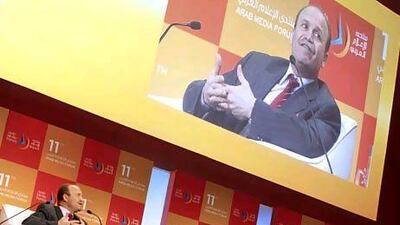Tunisia's new culture minister called for the media to be freed from government control in the wake of the Arab Spring.
In several of the countries hit by the regional unrest, media outlets - many of which have a history of state ownership - are currently negotiating a difficult transition in newly democratic societies.
How they may handle such a transition was a theme of yesterday's Arab Media Forum in Dubai.
"We don't want the media to be an arm of the regime," Mehdi Mabrouk, the minister of culture in Tunisia, told a panel at the forum.
"[The media has] to cover the news and events, not just to pass information from the government to the populace."
The veteran Saudi Arabian journalist Jamal Khashoggi called for an end to the government ownership of media in Egypt and across all Arab Spring countries.
"Because of our bad experience, we should go to that extreme," he said. "If I was an Egyptian, I would push for total separation between media and the state."
Mr Khashoggi, who is now managing Alarab, a TV news station set for launch early next year, said the separation of media and government should apply to all countries affected by the Arab Spring. "The media has failed, but it is not to be blamed. It was only a tool in the hand of the leader, of the regime," he said.
"The media's job was to glorify the leader, to glorify the party, to find excuses for him, for the failures from Nasser up to Mubarak."
Sawsan Al Sha'er, a prominent writer based in Bahrain, was part of a panel to discuss the changing Arab media industry, along with Mr Mabrouk.
She called for an independent media to better reflect what is going on in the Arab world. "The time of official media is over," she said. "In Bahrain, the government TV is not really following what is going on in the streets at all … We listen to Bahraini voices in channels other than the Bahraini ones."
Abdel Latif El Menawy, a television boss in Egypt under the Mubarak presidency, said that taxpayer-funded media was still viable.
"I don't think we can dispense with the state media, but I think we should reform it," he said.
Mr El Menawy came under fire from a member of the audience at the forum, who asked him to apologise for the incorrect news produced by the Egyptian media during the Mubarak years.
However the Arab media may be restructured, commentators acknowledged that it would be a long journey.
Randa Habib, the director for the Middle East and North Africa at the AFP Foundation, warned that change would not happen quickly.
"You cannot have an independent media in 24 hours," she said.
twitter: Follow and share our breaking business news. Follow us
iPad users can follow our twitterfeed via Flipboard - just search for Ind_Insights on the app.

